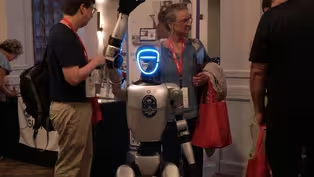
Local Jail Working to Reduce Recidivism
Clip: Season 4 Episode 6 | 5m 13sVideo has Closed Captions
The Pulaski County Detention Center is trying to break the recidivism cycle.
In Kentucky, one-third of released inmates commit another crime and end up reincarcerated. That number is declining, but recidivism is a cycle that can cause overcrowding in jails and adds strain to the criminal justice system. As Mackenzie Spink explains, the Pulaski County Detention Center has adopted a re-entry program to try and break that cycle.
Problems playing video? | Closed Captioning Feedback
Problems playing video? | Closed Captioning Feedback
Kentucky Edition is a local public television program presented by KET

Local Jail Working to Reduce Recidivism
Clip: Season 4 Episode 6 | 5m 13sVideo has Closed Captions
In Kentucky, one-third of released inmates commit another crime and end up reincarcerated. That number is declining, but recidivism is a cycle that can cause overcrowding in jails and adds strain to the criminal justice system. As Mackenzie Spink explains, the Pulaski County Detention Center has adopted a re-entry program to try and break that cycle.
Problems playing video? | Closed Captioning Feedback
How to Watch Kentucky Edition
Kentucky Edition is available to stream on pbs.org and the free PBS App, available on iPhone, Apple TV, Android TV, Android smartphones, Amazon Fire TV, Amazon Fire Tablet, Roku, Samsung Smart TV, and Vizio.
Providing Support for PBS.org
Learn Moreabout PBS online sponsorshipIn Kentucky, one third of released inmates commit another crime and end up back behind bars.
Now that number is declining, but recidivism, as it's called, is a cycle that can cause overcrowding in our jails and add strain to our criminal justice system.
Here in Pulaski County, officials have adopted a reentry program to try and break that cycle.
Our Mckenzi Spink explains.
Inmates at Pulaski County Detention Center have access to a variety of education opportunities, all with a focus on preparing them for life.
After release.
One of those opportunities is job training.
The jail was significantly overcrowded, and one of the things that we wanted to do is to be able to reduce the recidivism of the inmates coming back and one of the things we asked the local industry about here is what what are you seeing that we need the most right now?
And this is what our ideas are.
And but the industrial leaders said one of the biggest things we need right now is welders.
One of these local industry leaders is Hendrickson, a manufacturing company that has partnered with the detention center to hire inmates as welders.
You know, we would take them to work, you know, they earn their own paycheck at their own rate.
Come and security, bank, head checking accounts and savings accounts so that for where their check could be deposited.
Randy Cook was one of the first female inmates to take part in the welding program.
After eight weeks of training through Somerset Community College, she was hired at Hendrickson, a job that she says changed her life.
I know I wanted to do it.
I wanted to do anything, any opportunity they would give me.
I wanted to do, because I was coming up on my release.
I prayed, and I prayed a lot, you know, just, to be better before I got out because I didn't want to get out and get back in.
My kids just laugh and leave them again.
By the time I was released, I had, saved up and worked, enough money to get an apartment and to get a vehicle.
When I was getting out.
And I was pretty much, you know, set up for success.
And that changed my life.
That changed my kids life.
Another community partner is God's Food Pantry in Somerset.
Executive Director Brenda Russell says released inmates often find themselves there for a meal, but the pantry also offers full time volunteer hours to help them meet their parole requirements.
We create that atmosphere, an environment where they can come, they can help other people, and in the meantime, they're learning a job skill.
They're learning how to stock shelves, how to, rotate product, how to get along with others again, after a long time of being in confinement.
And those end up transferring into us being able to provide great recommendations when they go and apply for work somewhere in our community.
Having a felony on your record is hard to get employment, but the only way that those people coming out of incarceration are going to succeed is if somebody gives them a chance.
Jenna Schell is very familiar with the ins and outs of reentry, not just because she works for the state's Reentry and Employment Services branch, but because she had to make the same transition herself as a formerly incarcerated person.
I have done my fair share of time, and the last time that I did, I done 18 months and I was around 30 years old, and I was just so sick and tired.
And back then there wasn't anything like there is today for reentry.
And so I went through a program that it was the adult at office to where it was like a soft skills class.
If you completed it, it was like two weeks long, you automatically got an interview, for a factory, a local factory that was in town.
And so that was how I was able to get my first job, you know, because it's better now.
Employers one, you know, being okay with working with those that have a background, but especially back in the day, you know, a lot of people didn't want to.
A lot of employers didn't want to.
After taking an online class with the state's workforce development team, Gianna was offered an internship and eventually a job developing the Reentry and Employment Services branch.
Since joining the team, Jana has helped grow reentry programs all over the state.
We just kept growing and kept growing, and then eventually, that's when adult Ed picked us up and started funding.
And that's when we just now we're in like 80 something counties throughout the state.
And just it's hard to believe that four years ago that we were just in like 4 or 5 different, you know, counties around this area.
And now we're all over the state of Kentucky.
Pulaski was one of those first few counties to pioneer a reentry program.
I think this meant absolutely a successful program.
I think it was giving back to our workforce.
I think it is giving back to the, inmates to where, you know, they've been able to, have something, to be stable once they get out, something to look forward to once they get out.
McCollum says out of the 34 inmates who have graduated from the reentry program, only three have re offended.
For Kentucky edition, I'm Mckenzi Spink.
The Houseboat Capital of the World
Video has Closed Captions
Clip: S4 Ep6 | 6m 49s | The industry continues to be a big economic factor for the Lake Cumberland region. (6m 49s)
New JCPS Superintendent Talks Budget, Buses
Video has Closed Captions
Clip: S4 Ep6 | 1m 18s | Brian Yearwood says the district has enough bus drivers for the start of the school year. (1m 18s)
New Summit Focused on AI in the Classroom
Video has Closed Captions
Clip: S4 Ep6 | 3m 24s | Kentucky's first-ever A.I. Summit was held this week. (3m 24s)
Providing Support for PBS.org
Learn Moreabout PBS online sponsorship
- News and Public Affairs

Top journalists deliver compelling original analysis of the hour's headlines.

- News and Public Affairs

FRONTLINE is investigative journalism that questions, explains and changes our world.












Support for PBS provided by:
Kentucky Edition is a local public television program presented by KET


